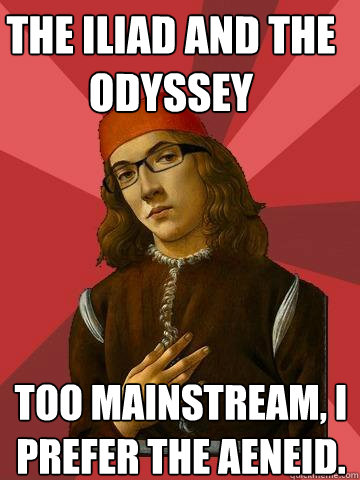
Posted on 11/17/2017 7:49:01 PM PST by nickcarraway
Attempting a new translation of “The Odyssey” is like directing “Hamlet.” Much of your audience knows the work well, and they take their seats with entrenched expectations and the intonations of favorite performances reverberating in their heads. At the same time, though, you will have audience members who have never seen the play, for whom you provide the introduction to a giant of Western literature. And let us not forget those who are there under duress, dreading the upcoming hours of boredom. You must find a way to speak to all these disparate groups, sneaking past the defenses of the devotees while drawing in those less familiar. It’s an ambitious task, one which calls for skill, cleverness and strong nerves, qualities that define “The Odyssey’s” wily protagonist himself.
The poem of Odysseus’s epic journey was composed in about the 8th century B.C., and its tale of a brilliant, exhausted veteran beset by dangers and yearning for home has been collecting admirers ever since. It is tradition, when reviewing a translation, to set a passage alongside its predecessors in translations by Fagles, Lattimore, Pope, etc. The reviewer then lays out the ways that the new translation either falls short or excels, quibbling over word choice and linguistic effects. This is a fun exercise and not without merit, but in the end, such a piecemeal approach is like judging productions of “Hamlet” on their “To Be or Not To Be.” It does not answer essential questions about the work as a whole: Does the translator have a thoughtful, comprehensive vision? Does she have the skill to sustain it? Does she chart a coherent course between often mutually exclusive virtues like literalism, musicality, clarity, beauty and readability? And most importantly, does she tell the story well?
(Excerpt) Read more at washingtonpost.com ...
Interesting.
And most importantly, does she tell the story well?>>>>>>>>>>>>>>>>>>>>
If she has balls.

I was completely unaware that one’s sex determines how a work is translated.
Learn something new every day, I suppose.
Ha! We actually studied it in junior high. 1965
I’d make a smart-@ss comment, but I was taught to R-E-S-P-E-C-T my Elders. ;)
A wise policy, vestal virgin.
Like leaves on trees the race of man is found,
Now green in youth, now withering on the ground;
Another race the following spring supplies:
They fall successive, and successive rise.
I would think that the best way to judge a translation of Homer’s epic would be to ask, “Is the story told the way Homer would have told it?”. Who would presume to improve on a work that has lasted almost three thousand years?
I welcome a new translation of the Odyssey. And I don’t often judge a book by its cover. But...
The cover shows three women in a well-known Minoan fresco. The Minoan civilization was, give or take, a thousand years before Homer. I’m in that camp which places the Trojan War at around 1200 BC. The Minoan civilization was long gone by then. Further, it was a different culture, different language altogether, from that of the Greeks depicted in the Odyssey.
Homer wouldn’t have written it down?
Sorry, dudette, but you are too late, because the greatest English interpretation of The Odyssey had already been written: Steely Dan’s ‘Home At Last’. And it is set to great music, too.
Her translation of Dante's Divine Comedy is considered one of the best, the first part was published in 1949.
If you want a "glass ceiling breaker," she would qualify.
This woman's work might be interesting or it might not but just being the "first women whatever" is no longer really anything worthy of interest.
“The Aeneid is pretty great. Try the Dryden translation.”
Yes, the Dryden translation is excellent, a joy to read. Penguin has an inexpensive edition: https://www.amazon.com/Virgils-Aeneid-Penguin-Classics-Virgil/dp/0140446273/ref=sr_1_1?ie=UTF8&qid=1510981753&sr=8-1&keywords=dryden+aeneid+penguin
And I’m willing to bet that when Sarah Ruden came out with her translation of the Aeneid in 2009 - the first by a woman - that it didn’t receive the same hoopla that this Emily Wilson translation is. https://www.amazon.com/Aeneid-Vergil/dp/0300151411/ref=sr_1_5?s=books&ie=UTF8&qid=1510982099&sr=1-5
Then again maybe Ruden didn’t get the star treatment because she’s a Christian, a Pauline apologist ( https://www.amazon.com/Paul-Among-People-Reinterpreted-Reimagined/dp/0385522576/ref=sr_1_2?s=books&ie=UTF8&qid=1510982099&sr=1-2 ) and a fan of St. Augustine ( https://www.amazon.com/Confessions-Modern-Library-Augustine/dp/0812996569/ref=sr_1_1?s=books&ie=UTF8&qid=1510982099&sr=1-1
Then again, maybe I’m just being unfair to Liberals. Maybe. Probably not.
As long as the godlike Telemachus is in it. I still remember that translation from high school.
Check. This is THE ILIAD in the Loeb Classical Library, and the greek is right there if you have any questions. And I've got to tell you, they've got more answers than I have questions!
Disclaimer: Opinions posted on Free Republic are those of the individual posters and do not necessarily represent the opinion of Free Republic or its management. All materials posted herein are protected by copyright law and the exemption for fair use of copyrighted works.